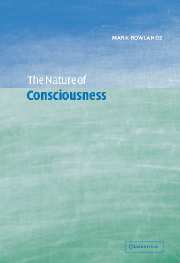Book contents
- Frontmatter
- Contents
- Preface
- 1 The problem of phenomenal consciousness
- 2 Consciousness and supervenience
- 3 The explanatory gap
- 4 Consciousness and higher-order experience
- 5 Consciousness and higher-order thoughts
- 6 The structure of consciousness
- 7 What it is like
- 8 Against objectualism II: mistakes about the way things seem
- 9 Consciousness and representation
- 10 Consciousness and the natural order
- Bibliography
- Index
10 - Consciousness and the natural order
Published online by Cambridge University Press: 22 September 2009
- Frontmatter
- Contents
- Preface
- 1 The problem of phenomenal consciousness
- 2 Consciousness and supervenience
- 3 The explanatory gap
- 4 Consciousness and higher-order experience
- 5 Consciousness and higher-order thoughts
- 6 The structure of consciousness
- 7 What it is like
- 8 Against objectualism II: mistakes about the way things seem
- 9 Consciousness and representation
- 10 Consciousness and the natural order
- Bibliography
- Index
Summary
If the arguments of preceding chapters are correct, then there are aspects of consciousness that are not objects of consciousness but, rather, exist in the directing of consciousness towards its objects. And to talk of the directing of consciousness towards its objects is to talk of consciousness revealing, or representing, its objects under one or another mode of presentation. Certain properties of consciousness, and I have argued this includes the phenomenal ones, are not items of which we are aware but those that constitute our being aware of distinct items in certain ways.
There is another way, more Kantian in flavour, of expressing this general idea. There are certain properties of consciousness, the phenomenal properties, that are transcendental relative to our experience of consciousness. These are not properties which we experience, but ones in virtue of which we experience, properties which constitute our experience as having a certain phenomenal character rather than another. In this chapter, I want to examine the ramifications of the transcendental character of phenomenal properties. In particular, I want to look at what consequences the transcendental status of phenomenal properties has for our understanding of the place of consciousness in the natural order.
What it is like and reductive explanation
In this section, I shall argue that the transcendental character of phenomenal properties precludes a reductive explanation of phenomenal consciousness. More precisely, I shall argue that the what it is like of conscious experience will, necessarily, for ever evade reductive explication.
- Type
- Chapter
- Information
- The Nature of Consciousness , pp. 216 - 235Publisher: Cambridge University PressPrint publication year: 2001



